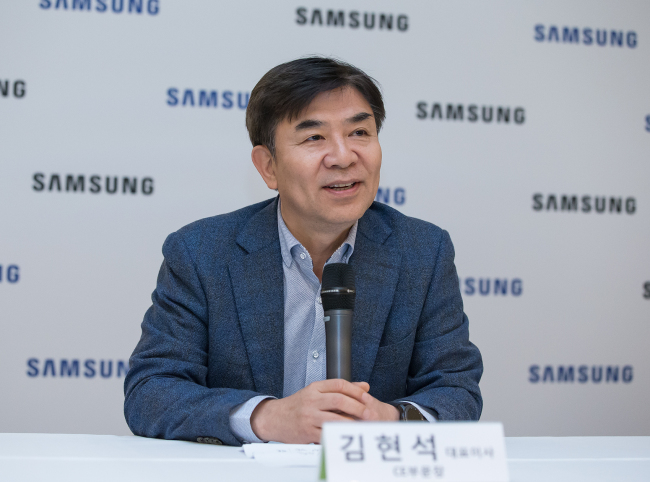BERLIN -- Samsung Electronics may not be the top player in the field of artificial intelligence just yet, but it could use its position as the world’s leading device manufacturer to negotiate collaboration with Google on AI, the company’s consumer electronics chief said Thursday.
“Samsung is developing its own voice assistant, Bixby, but we could consider various (forms) of collaboration with Google in the field,” said Kim Hyun-suk, Samsung’s president and CEO of consumer electronics, during a press conference at a hotel in Berlin, a day before the IFA 2018 was scheduled to kick off.
 |
Kim Hyun-suk, president and CEO of consumer electronics at Samsung Electronics, speaks during a press conference in Berlin on Thursday. (Samsung Electronics) |
“For example, we would call up Bixby, but it could lead us to one of Google’s services, like Google Map,” he said.
He was answering a question about the possibility of Samsung adopting Google Assistant for its home appliances, as other appliance manufacturers are increasingly doing these days.
Because Samsung’s Galaxy smartphones are powered by Android, Google Assistant is available on Samsung phones along with Bixby. However, some critics say, Google’s voice assistant outperforms Samsung’s.
“Each company has areas they particularly excel in, and collaboration is essential for perfect voice control,” Kim said. “Samsung is a company that sells around 500 million units of devices worldwide every year, and we can use this as our bargaining power to negotiate the level of cooperation with AI leaders like Google.”
The Samsung CEO, who also heads Samsung Research, which operates five AI centers on three continents, emphasized that the Korean company was capable of making any kind of hardware product, possibly including some robots. In contrast, he said, those AI leaders have no such manufacturing capabilities and can make only simple speakers upon which to run their voice-control software.
“However, what’s important here is to have the AI platform -- which I will call the brain -- regardless of hardware type,” he said.
Kim recalled the moment when Samsung first started talking about IoT -- three years ago at IFA 2015.
For two years after the initial discussion, there had not been much progress, he said. But as of this year, the focus had narrowed considerably as players discuss how to connect different types of devices and control them in an integrated manner.
“As an increasing number of devices have just got to be connected, and we are now talking about AI in order to control them,” he said, “voice is going to be a very crucial point of interaction … for the AI era, and (having a proprietary) voice technology will be a key competitive factor for companies.”
Under an investment plan announced recently, Samsung will invest approximately 25 trillion won in AI, Internet of Things and fifth-generation mobile network technology between now and 2020, including some mergers and acquisitions.
Kim also announced that Samsung’s AI centers would undertake an aggressive talent hunt, saying he hoped to expand the nascent research organization to include up to 1,000 experts.
“It is hard to say yet (whether) we are making money out of this, especially in B2C,” he said. “But we are seeing great potential in B2B -- for example, a business model that sells AI solutions to construction companies (for) turnkey projects in order to make (built-in AI solutions for households).”
By Song Su-hyun, The Korea Herald correspondent (
song@heraldcorp.com)







![[Today’s K-pop] Blackpink’s Jennie, Lisa invited to Coachella as solo acts](http://res.heraldm.com/phpwas/restmb_idxmake.php?idx=644&simg=/content/image/2024/11/21/20241121050099_0.jpg)
